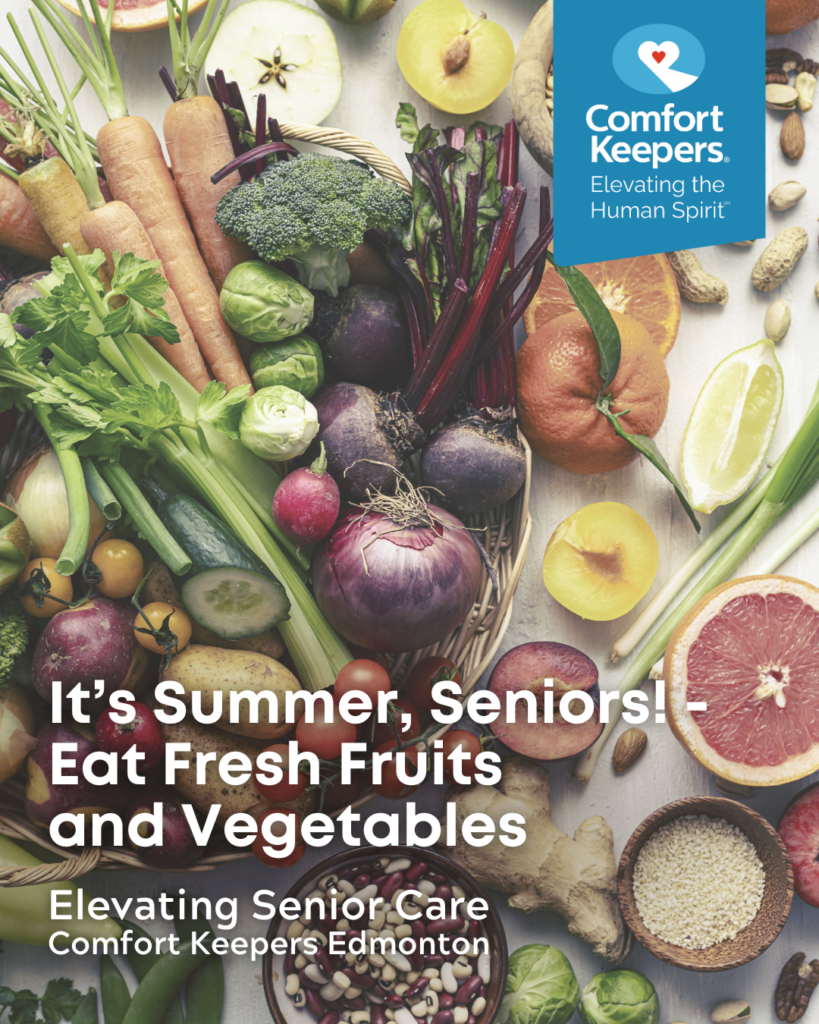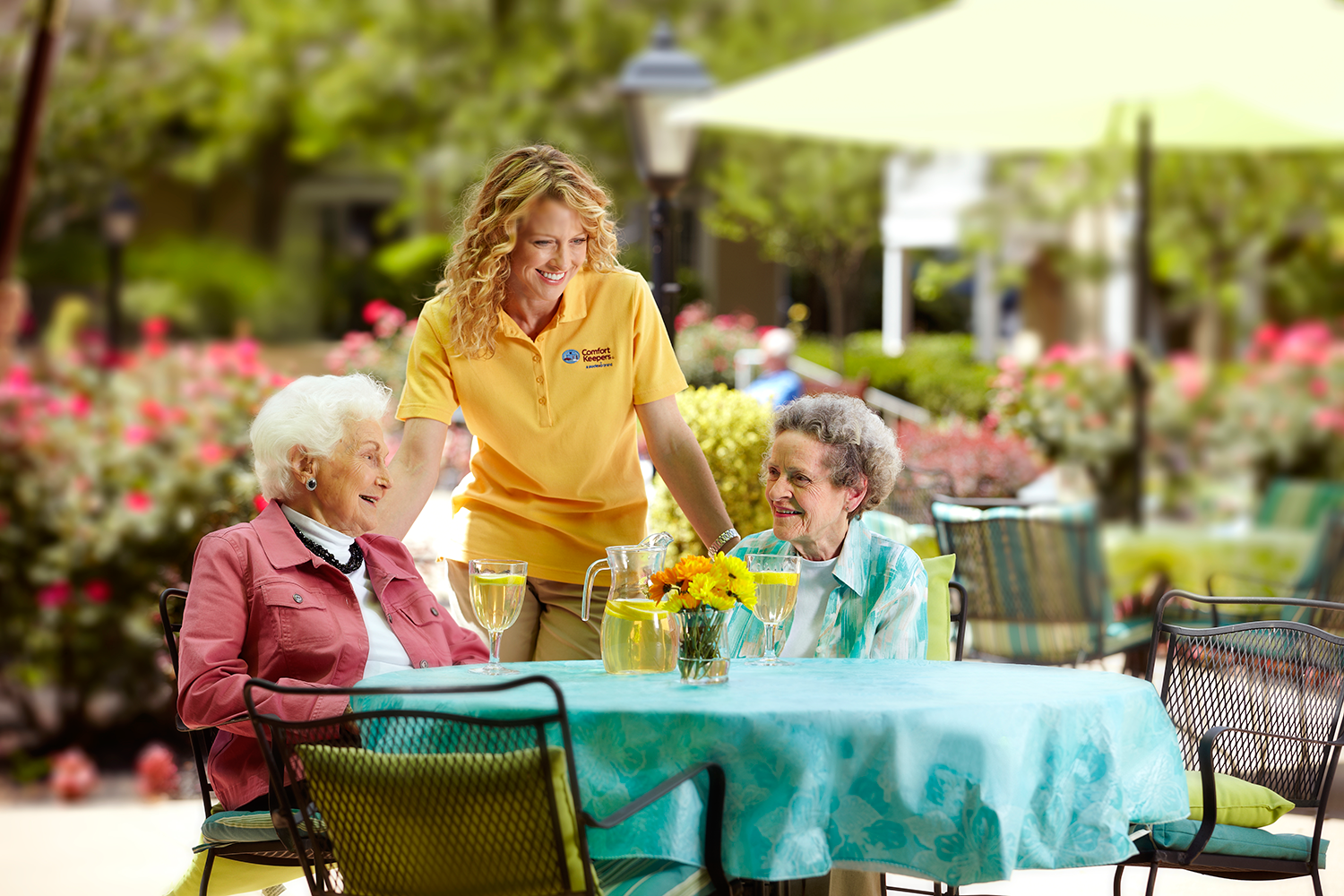It’s Summer, Seniors! – Eat Fresh Fruits and Vegetables
Senior Health | July 12, 2021

What Every Senior in Edmonton, AB, Needs to Know About Healthy Eating During the Summer Season
Eat Fresh Fruits and Vegetables | At long, last summer is here! And that means fresh fruits and vegetables straight from the garden, food co-op, roadside stand, or local grocery. As a caregiver, you can help the senior in your life eat well, enjoy the best of the season’s bounty, and reap the benefits of healthy eating.
How to Eat Well During the Summer Season
Eating well this season is about fresh, colourful food, and on many occasions, eating out of doors with family and friends which adds to the pleasure. For older adults, there are particular benefits of healthy eating. They include increased mental acuteness, resistance to illness and disease, higher energy levels, faster recuperation times, and better management of chronic health problems. Eating well can also be the key to a positive outlook and staying emotionally balanced.
Eat Fresh Fruits and Vegetables: Healthy Senior Portions
MyPlate for Older Adults, developed by Tufts University researchers to replace the USDA food pyramid, continues to emphasize the importance of fresh fruits and vegetables in the senior diet. Included among the recommendations of MyPlate are eating bright-coloured vegetables such as carrots, zucchini, summer squash, and broccoli, and deep-coloured fruit such as plums, berries, and melon.
Hydrating Foods for Seniors
Foods with high water content such as lettuce, garden fresh tomatoes, watermelon, homemade fruit, and vegetable juices are good for seniors to add hydration, especially during the heat of summer. Soups, such as gazpacho, which can be made from fresh vegetables and served chilled during warm weather are ideal and healthful, too.
Be Creative with Food for Seniors
Be creative in the kitchen. Making small changes in the way you prepare food can often help overcome the challenges of adding fresh fruits and vegetables to your senior’s diet. They can help him or her enjoy meals more, and assure that he or she gets the nutrients and energy needed for healthy, active living as well.
If your senior doesn’t feel like eating because food no longer tastes good, you can enhance the flavor of food by cooking meals in new ways or by adding different fresh herbs such as basil, dill, thyme, mint, or chives. Be sure to check with a doctor or registered dietitian about foods to include or avoid.
Eat Fresh Fruits and Vegetables: What They Do for Disease
Does your senior have cardiovascular disease, suffer from poor circulation, or have challenges with eye health such as macular degeneration or cataracts?
Antioxidant-Rich Foods for Seniors
Antioxidant-rich fruits are plentiful this time of year and are outstanding foods for protecting cardiovascular and eye health. Blueberries, blackberries, strawberries, mulberries, cherries, black plums, and even grapes – but especially fruits with dark purple pigments — fight inflammation and improve blood flow, and also help prevent blockages to the arteries.
Superfoods for Seniors
Superfoods like spinach, the king of the green leaves, and other good greens like kale, Swiss chard, turnip, mustard, and collard greens are rich in lutein, a carotenoid compound found in colorful fruits and vegetables that protect cells from damage.
A diet rich in spinach helps shield the macula, the center of the retina, from cell damage that can cause both age-related macular degeneration and cataracts. If your senior already has macular degeneration, he or she should be loading up on that vegetable.
Orange bell peppers are the best dietary source of the carotenoid zeaxanthin, the other carotenoid that concentrates in the back of the eye. They have a lot of vitamin C and more zeaxanthin per mouthful than any food on the planet.
Other orange vegetables such as pumpkin, squash, sweet potatoes, and carrots are also chock-full of vitamin A, which boosts night vision. They also contain carotene which helps lower the risk of cataracts.
Healthy Dessert Options for Seniors
Nothing harkens us back to our youth like the smell and taste of fresh fruit pies, tarts, cobblers, or crumbles. Adding fruits like peaches, mangoes, and berries to smoothies or homemade ice cream is a perfect way to get calcium, too.
Look for ways to combine foods from the different food groups in creative ways.
For instance, salsas or relishes made from a mixture of fresh fruits, vegetables, onions, and spices are ideal accompaniments to grilled fish or meats. You can do this while continuing to eat familiar foods that reflect your cultural, ethnic, or family traditions. Experiment with ethnic foods, regional dishes, or vegetarian recipes. Try new recipes from friends, newspapers, magazines, television cooking shows, or cooking websites.
Eat Fresh Fruits and Vegetables: Healthy Options this Summer!
Older adults can feel better immediately and stay healthy for the future by choosing healthy foods and the choice is never better than in summer. But as always, before you make any dietary changes for your senior, be sure to consult a doctor or a health care provider.
Comfort Keepers® Edmonton is Proud to Offer a Wide Range of Home Senior Care Services
Our trained caregivers will ensure your loved one is comfortable, independent and safe in their home. On top of that, we will also aim to enhance their overall health, quality of life and general happiness.
Top-Notch Home Healthcare for Seniors in Edmonton, Alberta
Comfort Keepers of Edmonton offers a wider range of senior care services. We offer retirement care, respite care, senior care, companionship care, end-of-life care, post-surgery care, palliative care, personal care, and senior living transition services. If you are concerned about the health and well-being of your aging loved ones we can help with 24-hour care and more!
Helping Seniors Age-in-Place with Companionship Care and Interactive Caregiving™
Empathetic care starts in the heart and allows us to meet our client’s needs. Our trained caregivers are selected with one specific quality in mind, empathy. We strive to stimulate our clients emotionally, mentally and socially, thus enhancing their overall quality of life.
Our Interactive Caregiving™ provides a system of care that addresses companionship, safety, nutrition, mind, body, and activities of daily living (ADLs). The system increases seniors’ sense of well-being, independence and companionship by focusing on Senior Mind, Senior Body, Senior Nutrition, and Senior Safety.
Affordable and Client-Directed Homecare is Available for Qualifying Albertans
Comfort Keepers® Edmonton is an Approved Service Provider for the Client Directed Homecare Invoicing (CDHCI) Program Offered by Alberta Health Services.
What is the Client Directed Home Care Invoicing Program (CDHCI)?
CDHCI is a great program provided by Alberta Health Services (AHS), allowing clients to choose an approved agency like, Comfort Keepers Edmonton for Personal Care, Respite Care and Homemaking needs. The chosen agency can then bill AHS directly for services rendered for approved hours through Alberta Blue Cross. Read more about the program HERE.
Accredited Home Care Edmonton
Comfort Keepers® Edmonton was awarded the “Accredited with Exemplary Standing” seal by Accreditation Canada. This honour demonstrates Comfort Keepers’ commitment to offering safe, high-quality home care to its senior clients in Edmonton, AB.
To learn more about senior in-home care in Edmonton, contact the Comfort Keepers® office. Our service territory includes Edmonton, Devon, Sherwood Park, Stony Plain and surrounding areas, contact the Comfort Keepers Edmonton office at 780-465-4665.
References
‘Eating Well As You Get Older’, published by National Institute on Aging on NIH Senior Health
‘MyPlate for Older Adults,’ Published on Friedman School of Nutrition Science and Policy
‘Foods for Your Anti-Aging Diet’, By Peter Janet, Reviewed by Brunilda Nazario, MD
‘20 Common Foods with the Most Antioxidants’, published by WebMD
Individualized Home Care Options
Long-Term Home Care, 24 Hour Home Care & Short Term Care Options Customized for You







